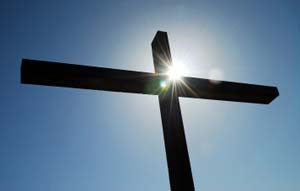 |
So where did Lent come from? Let’s start by saying that Christianity embraces one key belief: the resurrection of Jesus Christ from the dead. This central article of faith shapes everything we do as Christians, how we live and die, and certainly how we express our faith in worship. Easter is therefore the primary day of rejoicing. Every Sunday is considered a “little Easter,” a commemoration of how Jesus triumphed over sin and death through the power of God for the sake of humanity’s emancipation from those ancient twin evils that bound it. The entire church year spins on the axis of Easter faith.
In the first three centuries of the church Christians prepared for this mother-of-all-feasts by fasting—between two days to a week depending on local custom. In Rome the “paschal fast” may have lasted as long as three weeks. This extended fast was linked to the preparation of new members for baptism at the Easter Vigil.
By the 4th century a full 40-day period of preparation was observed, imitating the 40-day fast of Jesus in the desert before undertaking his great mission. Fasting and prayer were natural components of the season because that’s how Jesus prepared himself. Almsgiving was added to the practices of Lent as it, too, was a traditional way of making sacrifice to God in the wake of sinfulness. Following a calendar of feasts and seasons dependent on one’s faith is an idea rooted in Judaism. The Law of Moses established fixed times annually to recall the saving actions of God, centered on the commemoration of Passover. A liturgical calendar allowed Israel to practice gratitude and thanks, repentance and conversion, each in accord with the natural seasons, rains, and harvests. A cycle of liturgy also provided a way to instruct new generations about the faith in ritual and storytelling.
Easter, the Christian Passover, was fixed by the Council of Nicaea in 325 to coincide with the first full moon after the vernal equinox. That makes Lent the annual “springtime” of faith, quite literally, as the word—Lent—comes from.
Scripture
• Mark 1:12-13; Matthew 4:1-2; Luke 4:1-3; Leviticus 23
Online
• “Grave matters: Take away the Resurrection and the center of Christianity collapses,” article by N. T. Wright
• For fun: Wiki article on “computus,” the complicated story of calculating the date of Easter
Books
• Embracing the Sacred Seasons of Lent and Easter: Daily Reflections and Prayers by Janis Yaekel (Twenty-Third Publications, 2005)
• Living Liturgy: Spirituality, Celebration, and Catechesis for Sundays and Solemnities (Liturgical Press)
Ask Alice a question.

More questions...and responses
What’s so important about the Council of Trent?
What are the “Precepts of the Church”?
Do Catholics take the biblical creation story literally?
Why can’t a woman be ordained?
Is Purgatory still “on the books”?
Why is it important to participate regularly in the Mass?
Why can people go to Mass on Saturday evening instead of Sunday?
Did King David compose the psalms?
Who were Jesus' “brothers and sisters”?
Is there really a Catholic Index of Forbidden Books?
What are the corporal and spiritual works of mercy?
What’s the difference between celibacy and chastity?
Is it “Catholic” to be vegetarian? Do Catholics care about animal suffering?
What does the Bible say about Judgment Day?
Why do Christians believe Jesus is God incarnate?
What’s that picture of Jesus with rays flowing from him?
Who chose the "Seven Deadly Sins"?
"What should I believe about hell?"
Is the Mass a “holy sacrifice” or a “celebration”—or both?
Pulpit, lectern, ambo: What’s the difference?
What is “discernment of spirits”?
Is environmentalism “Catholic” or a political football?
Why do Catholics believe in the Immaculate Conception?
Do Catholics believe in ghosts?
What is the Liturgy of the Hours?
How does God “answer” prayers?
What does “salvation history” mean?
Why do Catholics believe in the Assumption of Mary?
Why do priests wear vestments?
What is Catholic decision-making?
How does the Catholic Church view other religions?
What's the difference between chapels, churches, cathedrals, and basilicas?
Where do the Stations of the Cross come from?
What's the relationship between the Old Testament and the New Testament?
When and where is it appropriate to bow inside Catholic churches?
Can I come back to the church?
Why does the priest talk after the readings at Mass?
What's the difference between catechesis and evangelization?
Didn't Saint Paul write all the letters attributed to him?
Are we supposed to believe in angels and demons in the 21st century?
Who are the saints and why do we pray to them?
Who are the "Doctors of the Church"?
How were the books of the Bible chosen?
What's the difference between saying "set" prayers and prayers in my own words?
What do Catholics have to believe?
Who were the prophets? Does God still call people to prophecy?
Why do Catholics bless themselves, genuflect, and so on?
What do we mean by the church’s “magisterium”?
Is there salvation outside the Catholic Church?
What do people in religious life do for fun?
Why is celibacy important to religious life?
Vocation: For all of life, or only "religious life"?
Is my vocation from God or just my imagination?
What does the Bible say about discipleship?
How do I know whether be an order priest or a diocesan priest?
What do Catholics believe about scripture and tradition?
"Sin" is such a negative word. Can't we just talk about “failure”?

